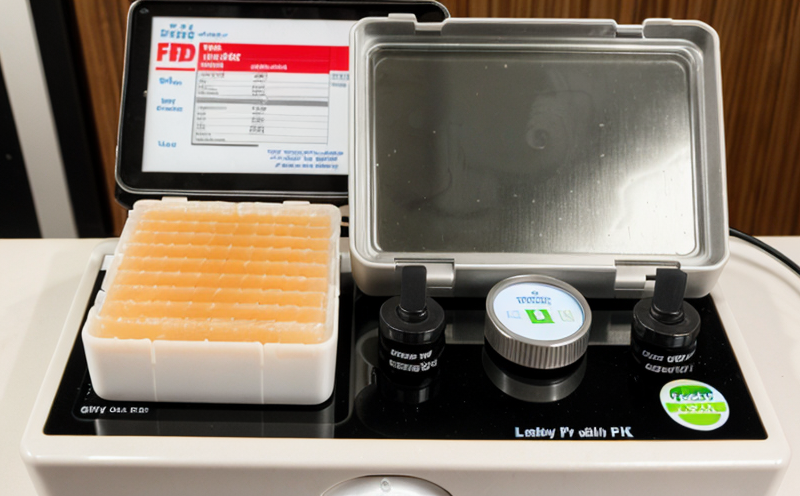EN 15085 Lipid Profiling in Dairy-Based Drinks
The European Standard EN 15085 provides a standardized method for lipid profiling in dairy-based drinks, ensuring the accurate quantification and characterization of fatty acids. This service is essential for quality managers, compliance officers, R&D engineers, and procurement personnel in the food and beverage sector to ensure product integrity, safety, and regulatory compliance.
The process involves detailed extraction techniques that separate various lipid components from dairy-based drinks. The extracted lipids are then analyzed using gas chromatography (GC) or liquid chromatography coupled with mass spectrometry (LC-MS). This allows for the precise identification and quantification of individual fatty acids, which is critical in understanding the nutritional profile and quality of the product.
The standardization provided by EN 15085 ensures that results are consistent across different laboratories, enhancing reliability. It also helps in monitoring changes over time, such as variations due to seasonal production or supply chain disruptions. This service is particularly valuable for manufacturers who need to ensure their products meet strict nutritional requirements and comply with international standards.
One of the key benefits of EN 15085 lipid profiling is its ability to detect trace amounts of fatty acids that might not be visible through other methods. This sensitivity is crucial in identifying potential adulteration or contamination, which can have significant impacts on product quality and consumer health. The service also supports R&D efforts by providing detailed data that can guide formulation adjustments and new product development.
Another important aspect of this service is the ability to monitor the stability of fatty acid content over time. This is particularly relevant for products with long shelf-lives, as it allows manufacturers to track any potential degradation or change in composition that could affect the taste, texture, and nutritional value of their product.
The standard also facilitates better supply chain management by providing consistent quality data. This ensures that all ingredients used in the production process meet the required specifications, thereby maintaining the overall quality of the final product. For procurement teams, this service offers a reliable tool for verifying the authenticity and quality of raw materials and finished products.
Moreover, EN 15085 lipid profiling supports regulatory compliance by ensuring that all products comply with relevant food safety regulations. This is especially important in today’s globalized market where non-compliance can lead to significant legal and financial consequences. By adhering to this standard, manufacturers can demonstrate their commitment to quality and safety, enhancing consumer trust and satisfaction.
It is worth noting that the use of this standard goes beyond mere compliance; it also contributes to sustainable practices by promoting efficient resource utilization and minimizing waste. Through accurate lipid profiling, manufacturers can optimize production processes and reduce unnecessary inputs, leading to a more environmentally friendly operation.
In conclusion, EN 15085 lipid profiling is a cornerstone of modern dairy-based drink manufacturing. It ensures product consistency, supports R&D efforts, enhances supply chain management, facilitates regulatory compliance, and promotes sustainability. Its importance cannot be overstated for any organization involved in the production or quality assurance of dairy-based drinks.
Why It Matters
The accurate quantification and characterization of fatty acids are crucial for several reasons. Firstly, it ensures that products meet strict nutritional requirements, which is increasingly important as consumers become more health-conscious. Secondly, it helps in identifying potential adulteration or contamination, ensuring product integrity and safety. Thirdly, it supports R&D efforts by providing detailed data that can guide formulation adjustments and new product development.
Moreover, consistent quality data provided by this service enhances supply chain management, allowing manufacturers to track any potential degradation or change in composition over time. This is particularly relevant for products with long shelf-lives, as it ensures the taste, texture, and nutritional value of their product remain consistent.
Regulatory compliance is another critical aspect. By adhering to this standard, manufacturers can demonstrate their commitment to quality and safety, enhancing consumer trust and satisfaction. Furthermore, it contributes to sustainable practices by promoting efficient resource utilization and minimizing waste.
Why Choose This Test
The choice of EN 15085 lipid profiling is driven by several factors that make it a preferred method among quality managers, compliance officers, R&D engineers, and procurement personnel. Firstly, its standardized approach ensures consistent results across different laboratories, enhancing reliability.
Secondly, the sensitivity provided by this service allows for the detection of trace amounts of fatty acids that might not be visible through other methods. This is crucial in identifying potential adulteration or contamination, ensuring product integrity and safety. It also supports R&D efforts by providing detailed data that can guide formulation adjustments and new product development.
Thirdly, consistent quality data provided by this service enhances supply chain management, allowing manufacturers to track any potential degradation or change in composition over time. This is particularly relevant for products with long shelf-lives, as it ensures the taste, texture, and nutritional value of their product remain consistent.
Furthermore, regulatory compliance is another critical aspect. By adhering to this standard, manufacturers can demonstrate their commitment to quality and safety, enhancing consumer trust and satisfaction. Additionally, it contributes to sustainable practices by promoting efficient resource utilization and minimizing waste.
International Acceptance and Recognition
The European Standard EN 15085 has gained widespread acceptance and recognition across the global food industry. Its standardized approach ensures consistency in results, which is crucial for maintaining quality and compliance with international standards.
Many countries have adopted similar or equivalent methods to EN 15085, recognizing its importance in ensuring product integrity and safety. This standardization not only enhances reliability but also supports the exchange of data between different laboratories, facilitating better collaboration and communication within the industry.
The acceptance and recognition of this standard extend beyond national boundaries, making it an essential tool for manufacturers operating globally. By adhering to EN 15085, companies can ensure that their products meet international standards, thereby expanding their market reach and enhancing consumer trust.





